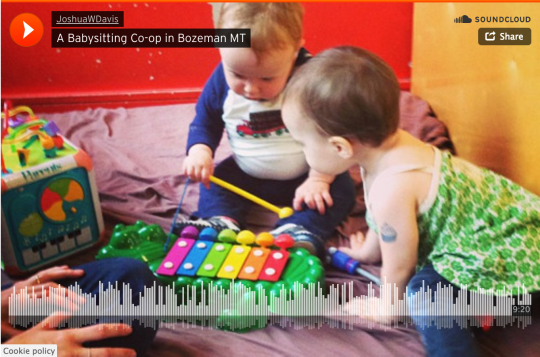what’s the proper scale for an economy?: how a small babysitting co-op created a model for local economies
06 Jan 2017the other day i checked my friend nene’s blog and saw that she had shared this audio interview piece: http://geo.coop/story/poker-chips-and-friendships-babysitting-co-op

i listened to it and was starstruck. i entered grad school with a huge level of excitement about “the new(/sharing/collaborative/solidarity) economy” and have since beent turned off from it as it is increasingly captured by “the old economy” (see jason spicer’s piece on why the sharing economy isn’t really sharing). this piece reminded me of why i was interested in the alternative economy in the first place.
quick summary in case you don’t listen to the piece: a small group (12-15 i think?) of families created and ran a babysitting co-op that used poker chips as currency. when you needed babysitting, you gave chips and when you babysat you earned chips. there were were 15, 30, and 60 minute chips.
now, first of all, this lines up critically with a scale of a project that makes sense. wendell berry talks a lot about the proper scale of community. communities that are too large simply don’t function the same, largely because people become unknown to each other. it’s much easier to have a functioning economy when you know the people you’re connected to in the system. one of the problems with capitalism is that in its search for profits, it seeks increased scale. this means that it’s impossible to know everyone to whom you’re economically connected. since all of our economic decisions impact each other, it’s important to be able to see those impacts. economic systems that are too large make it easy to miss the human consequences of our decisions.
i could go on, but the point i wanted to land on were the following two insights. these are snippets from the transcribed audio:
- Josh (interviewer): What you said just there was pretty interesting about how this […] functioned not only as a system for making sure people had adequate babysitting when they needed it, but maybe also to make sure that couples were getting out and having enough time for themselves that maybe they wouldn’t have been forced to do if they weren’t part of the co-op.
Claudia (interviewee): That’s true. That’s right. And I think they forget that they need to do that. You know, you’d find ways to do things without spending money, but just getting away and having some time as a couple together was important. And you forget that sometimes in your busy life. So yeah, it was a way to say, “Hey! you guys need to go, we’ll take your kids. I need chips, you got chips.” Yeah, that happened"when some people had too many chips we made them go out more so we could babysit their kids and get their chips. it ended up creating a system of checks and balances against hoarding. this probably helped some people’s relationships. - Josh: So when you took care of somebody else’s kids for an hour they would give you the relevant amount of poker chips for that, and then you could use those poker chips to spend to get babysitting for your own kids?
Claudia: That’s right. And the nicest thing about it was you know if you just did it amongst friends with no poker chips or you just, say, had one friend or something, you always felt obligated to that one person, where this way you only felt obligated to the group. So you didn’t have to feel like just because you babysat for Joe and Sue’s kid that they had to babysit back for you. That wasn’t the way it worked. You could call anybody. And you might have kids that you especially liked to take care of, and then you might have a couple that you preferred to take care of your kids. And it didn’t matter, nobody’s feelings were hurt. All you did was, you know, you were working with the group.
how fucking cool is that? this is the scale of economy i’m interested in. these types of things are what we need more imagination around and examples of. gotta get on that.
writing: 9:01
spell-check, link-finding, & formatting: 12:57